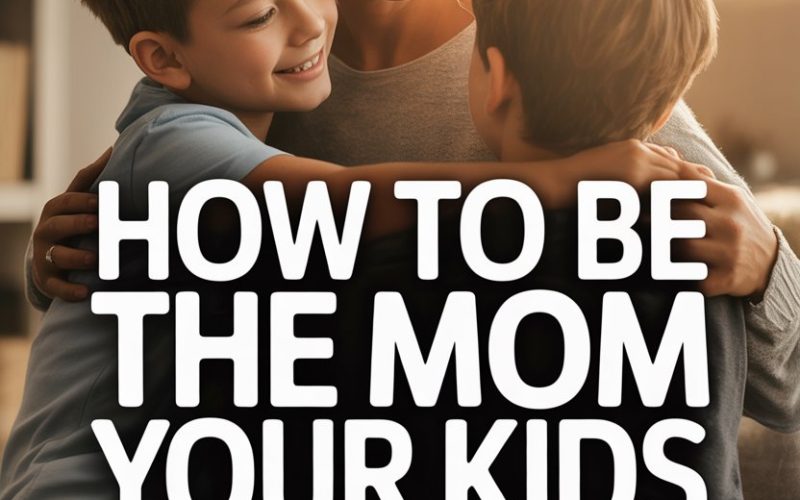The years are short, aren’t they? Blink and you’re tripping over LEGO bricks, blink again and you’re waving at the back of your child’s head as they head into high school.
For busy parents, the dream is simple: be the mum your kids remember with warmth, a bit of laughter, and maybe even gratitude (one can wish).
Here’s how to shift from survival mode to memories mode—even when your calendar looks like a game of Tetris gone wrong.
Small Gestures, Big Impressions
Grand gestures are fun, but it’s the little, everyday quirks that stick.
You don’t need to host a Pinterest-worthy birthday every year, but you can create a “Wednesday Pancake Dinner” tradition, dance to silly songs while cleaning, or sneak a doodle into a lunchbox.
Research shows that small, repeated rituals—like bedtime stories or weekly pizza nights—build a sense of security while giving your children something to carry with them, long after they’ve moved out (and hopefully learned to do their own laundry).
Listen Like There’s Nothing Else Going On
Your phone buzzes. The cat yowls. The laundry beeps with the urgency of a nuclear power plant. Yet when your child wants to talk—about dinosaurs, the latest friendship drama, or why socks never match—try to give your full attention.
Eye contact, a neutral “mm-hmm,” and actual curiosity work wonders.
A study from Harvard found that children thrive on “serve and return” interactions—back-and-forth chats that make them feel heard. Even five minutes of real connection can outshine hours of distracted multitasking.
Apologise and Laugh Off the Small Stuff
Some days you’ll yell. You’ll forget the permission slip, or call your child by the dog’s name. It’s okay—your kids aren’t expecting a saint, just someone honest.
When you mess up, apologise. A sincere “Sorry, I was cranky and shouldn’t have snapped at you” teaches them that adults aren’t flawless, and that relationships are about repair, not perfection.
Bonus: laughing at your own mistakes models resilience.
Ever tried to frost a birthday cake at midnight and ended up with something that looks like modern art? Your kids will remember the giggles, not the crooked candles.
Say Yes Whenever You Can
Boundaries are crucial (no, you can’t eat ice cream for breakfast every day), but how often do we say “no” out of habit, not logic? Every now and then, say yes to the mud pies, the extra bedtime story, the walk in the rain.
Unplanned adventures make the best anecdotes. Your child will recall those rare, magical times you bent the rules—not what your living room carpet looked like.
Stories Beat Stuff
During gift-giving season, it’s tempting to buy every shiny thing advertised between children’s TV shows.
But researchers at the University of Illinois found that experiences—trips to the park, making cookies, building a fort from every cushion in the house—create stronger, happier memories than material goods.
If you can, invest your time and energy in shared experiences, not just things.
Be Honest About the Hard Bits
Some days, parenting feels like wading through treacle. Admit it.
When your kids see you coping with challenges—work stress, family illness, flat tyre on the school run—they learn that life isn’t always smooth.
Give them age-appropriate honesty (“I’m tired because work is busy, but I love you and I’m glad we’re having dinner together”). This builds empathy and resilience. Plus, it’s a relief not to keep up a superhero act 24/7.
Let Them Teach You Something
Even if your child is currently obsessed with Minecraft, TikTok dances, or some YouTube channel that makes you question the future of humanity, ask them to show you.
Try their game. Learn the floss. Fake enthusiasm, if needed.
When you let your child be the expert, you’re telling them their interests matter to you. This opens up chances for connection, and maybe—just maybe—you’ll get a glimpse into what lights them up.
Capture the Moments That Matter (But Not Every Moment)
Taking photos is practically reflexive now, but don’t let your phone be a barrier between you and the memory. Snap a few shots, then get in the frame yourself. (No one cares if you have a spot or your roots are showing.)
Your kids want proof you were there, too. Some research, like this study in the Journal of Personality and Social Psychology, suggests that being present in the moment—not just recording it—builds stronger recollections for everyone.
Accept That You’ll Never ‘Do It All’
There’s a special kind of pressure on modern mums to be everything: the healthy lunch-packer, the birthday-party magician, the career superstar, the Instagram-worthy home decorator.
No one manages all of it, and your kids certainly won’t recall who ironed the pillowcases. Choose what matters most in your family.
Say yes to messy crafts if you love them, or skip the PTA entirely if meetings suck your soul dry. What your children remember isn’t your to-do list, but your love and quirks.
Let Your Love Shine Through the Chaos
If there’s a secret ingredient, it’s this one. Love doesn’t mean never losing your temper or keeping the house spotless.
It’s the look you give when your child tells a terrible joke. The way you tuck the duvet under their chin. The extra biscuit when they’ve had a tough day.
Children notice the little ways you show up, even when you’re tired or grumpy or running late (again). They may not mention it now—but the warmth sticks with them.
Your Greatest Hits Album, Mum Edition
The future you is likely to be remembered in flashes: the smell of your hair, your weird victory dance, the way you always burnt toast on Sundays.
The good news? It’s not about being some mythical Supermum. It’s about being there, being real, being you.
Every family’s ‘greatest hits’ album will sound a little different, but the love and laughter are always the chart-toppers.
So, here’s to being perfectly imperfect—just the way they’ll remember you.




